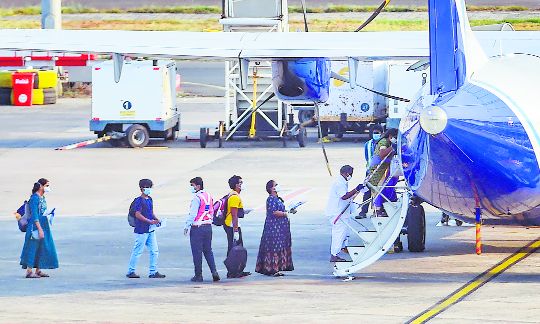
Vulnerable: Gujarat, Kerala and Punjab have a high inflow and outflow because a lot of their natives live abroad.
Luv Puri
Journalist and Author
The over two-month-long fight against Covid-19 has imparted governance lessons and these should be factored in while preparing future responses even as policymakers grapple with the need to revive the economy in the face of the challenging pursuit of arresting the spread of the virus.
The idea of a national lockdown and one-size-fits-all seems incongruous, particularly for big and diverse countries. In India, each state had its own distinct challenges and needs. The Covid-19 caseload has crossed 1.9 lakh, but unpacking the numbers indicates that the seven states alone have nearly 75 per cent of the total numbers. Maharashtra, followed by Tamil Nadu, Gujarat, Delhi, Rajasthan, Madhya Pradesh and Uttar Pradesh are the seven states. And about 10 cities alone account for approximately 70 per cent of the cases.
The role of the Centre is important during a global pandemic. It can judiciously procure the necessary medical supplies from international markets at a reasonable price. Warning systems, broad guidelines and best practices on the basis of information and studies from various sources globally, including from various national diplomatic missions, can suitably be activated. However, the states are where the rubber hits the road in terms of implementation.
A geographically sparse populated state in the North-East may require a different approach from the congested and densely inhabited parts of the country. In the same vein, some of the states, such as Gujarat, Kerala and Punjab that have high inflow and outflow from outside, primarily because a lot of their natives have family members who live abroad, are vulnerable as they could import Covid-19 patients.
There is a caveat. Kerala is one of the highest global exporters of health workers and this fact probably is one of the catalysts for a greater societal awareness of the health challenges. According to the Indian Nursing Council, of the 20 lakh registered nurses in India, 18 lakh are reportedly from Kerala alone.
Coupled with the factor of population density, Mumbai, the country’s financial capital, and Delhi, the national capital, too have their distinct challenges, including a lot of foreign travel. It is not just the absolute population density but also the internal residential density, which is based on the number of occupants per room in a household, that is a factor that requires special attention. It is underlined by NYC-based Citizens Housing and Planning Council, a non-profit research and education organisation, in its latest study. For instance, the study underlines that Seoul, which has greater population density than New York City, suffered far less Covid-19 caseloads.
In this connection, an all-society approach is critical to understanding each state’s vulnerabilities. There is no need to reinvent the wheel. The last few months of excessive centralisation in meeting the challenge of Covid-19 spread has dismantled the time-tested governance models.
In the past, during a crisis-like situation such as social unrest and natural calamity, it is the normal practice of the local administrations to activate local citizens’ consultative forums, comprising citizens from various professions such as doctors, academics, activists and NGOs as a part of its crisis response strategy.
The idea is that even with the best of intentions, the ruling political elite and its official machinery will have blind spots and, it is essential to have information and knowledge from a broader spectrum of society. The excuse that such meetings could not take place because of the risk of infections is not valid. Online interactive tools such as Skype have eliminated the need to physically meet at one place.
The inputs of local health workers, doctors as well as nurses are important to tailor the broad guidelines of the Centre in the face of the differing capacities of the health system of each state. For instance, during the earlier lockdowns, it was seen that in some cases, emergency units of public hospitals refused patients, even those who had non-Covid-19 symptoms, as they were asked to produce a Covid-19-free certificate. This proved fatal for some patients.
Such incongruities could be immediately addressed if there is an adequate community feedback loop available to the decision-making processes to correct the malaise. Social scientists can provide specific and nuanced inputs on different aspects of each region in relation to the Covid-19. They can also sensitise the administrations of societal and economic vulnerabilities as any crisis has the potential of deepening societal fault-lines. The business community can help the administrators in reducing the economic costs of such extreme measures as lockdowns. NGOs can complement the efforts of state officials in public outreach in combating misinformation and inculcating behavioural changes such as social distancing to contain a contagion.
Going forward, there are practical global best practices that can be studied and contextually replicated as efforts are made to revive the economy. One of the strategies employed by North-Eastern and Mid-Western states of the US is the formation of a regional consortium. The rationale is that geographically contiguous states have greater linkages with each other, both in terms of high inter-state civilian traffic and economics. The spread of virus in one state greatly enhances the risk to the neighbouring state. In a consortium, each state can share information on one platform with the others.
The consortium can also develop joint contingency plans to compliment health capacities of one another and also coordinate inter-state movement as the situation demands. For instance, in the North, Punjab, Haryana, Rajasthan, Delhi and Uttar Pradesh can be one consortium. In the same vein, Gujarat, Maharashtra and Madhya Pradesh can be another. In the South, there can be a similar institutional set-up of coordination among Tamil Nadu, Kerala and Karnataka.
The fight against Covid-19 is multi-dimensional. This requires creative, complementary and calibrated responses to each context through proactive local governance structures, along with synergy with the Centre.
Join Whatsapp Channel of The Tribune for latest updates.




























